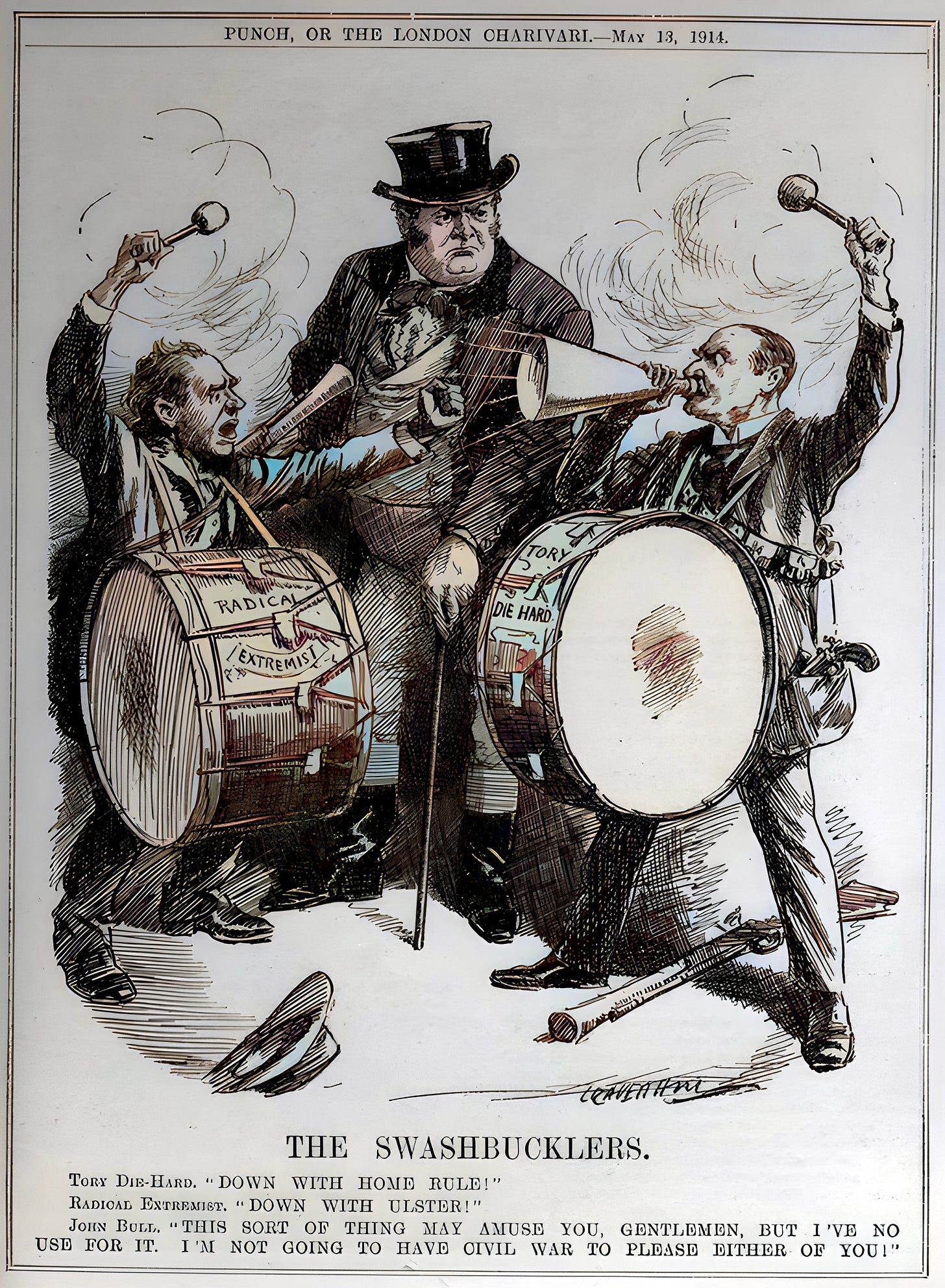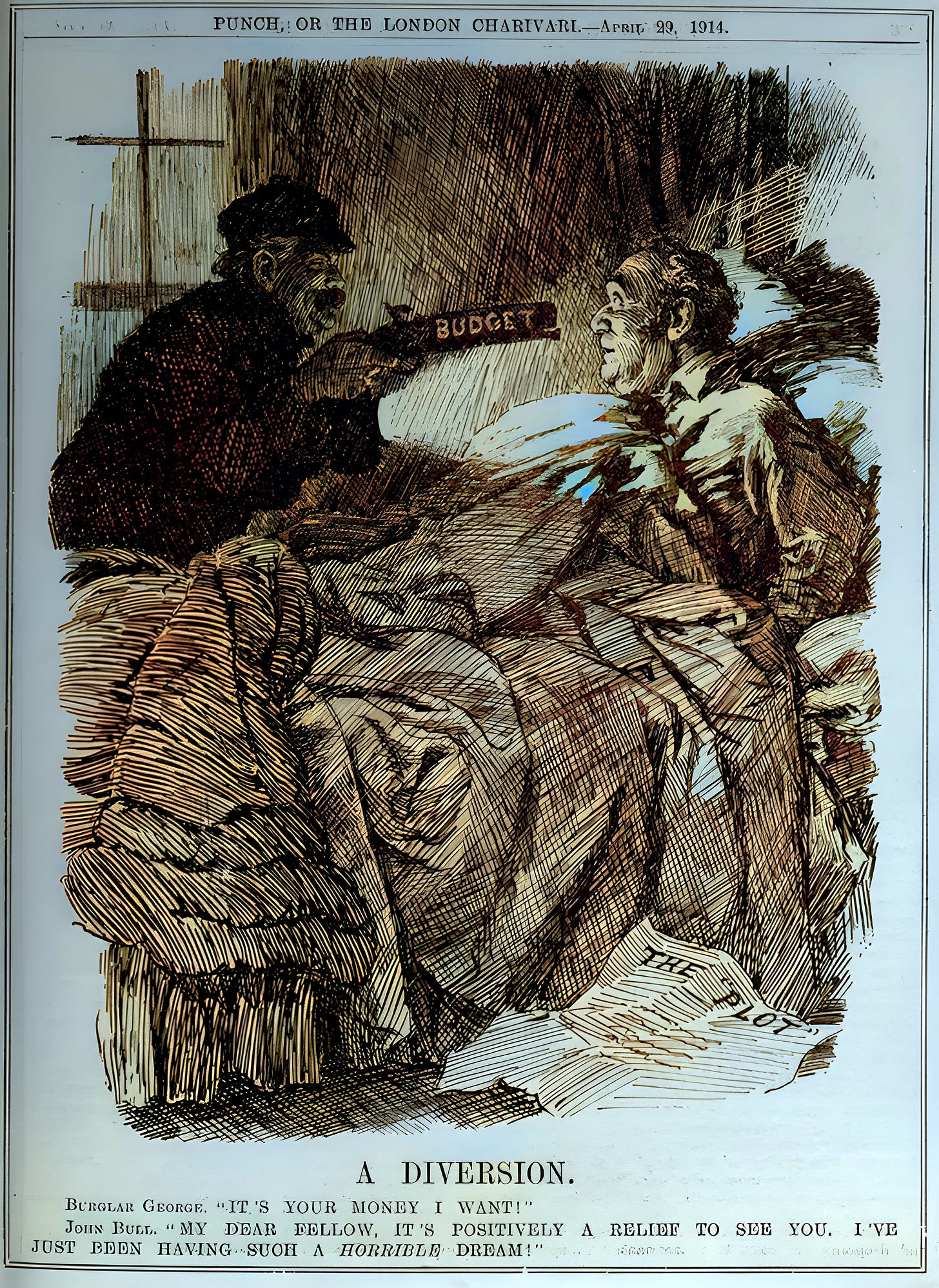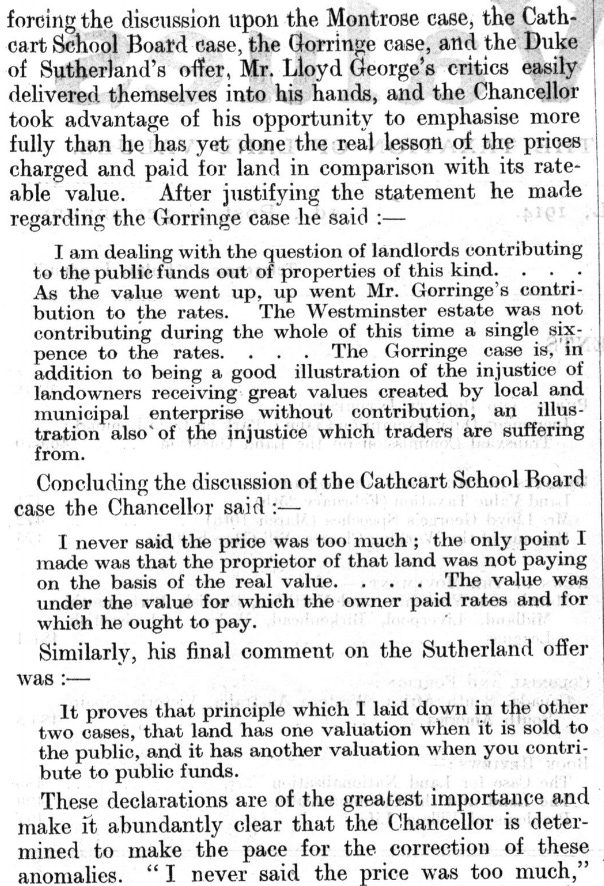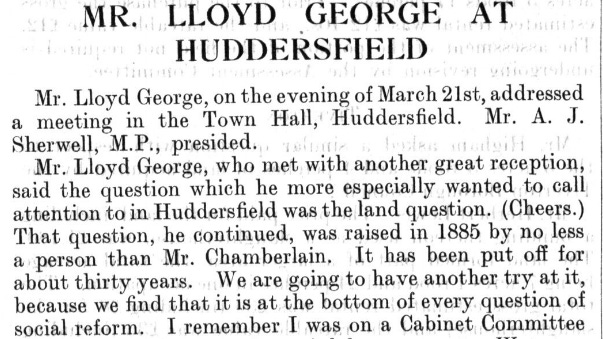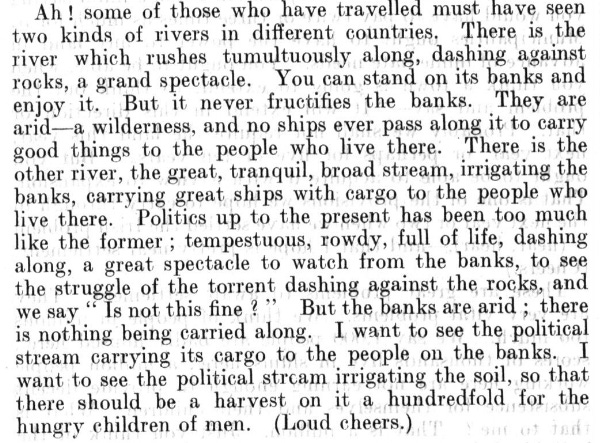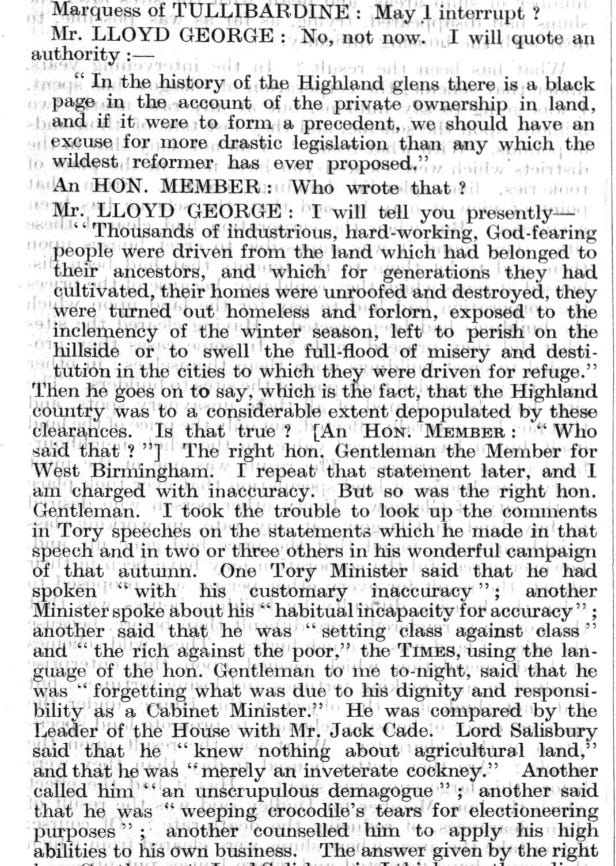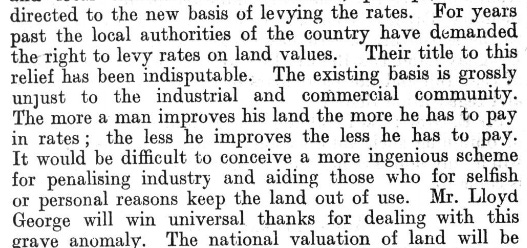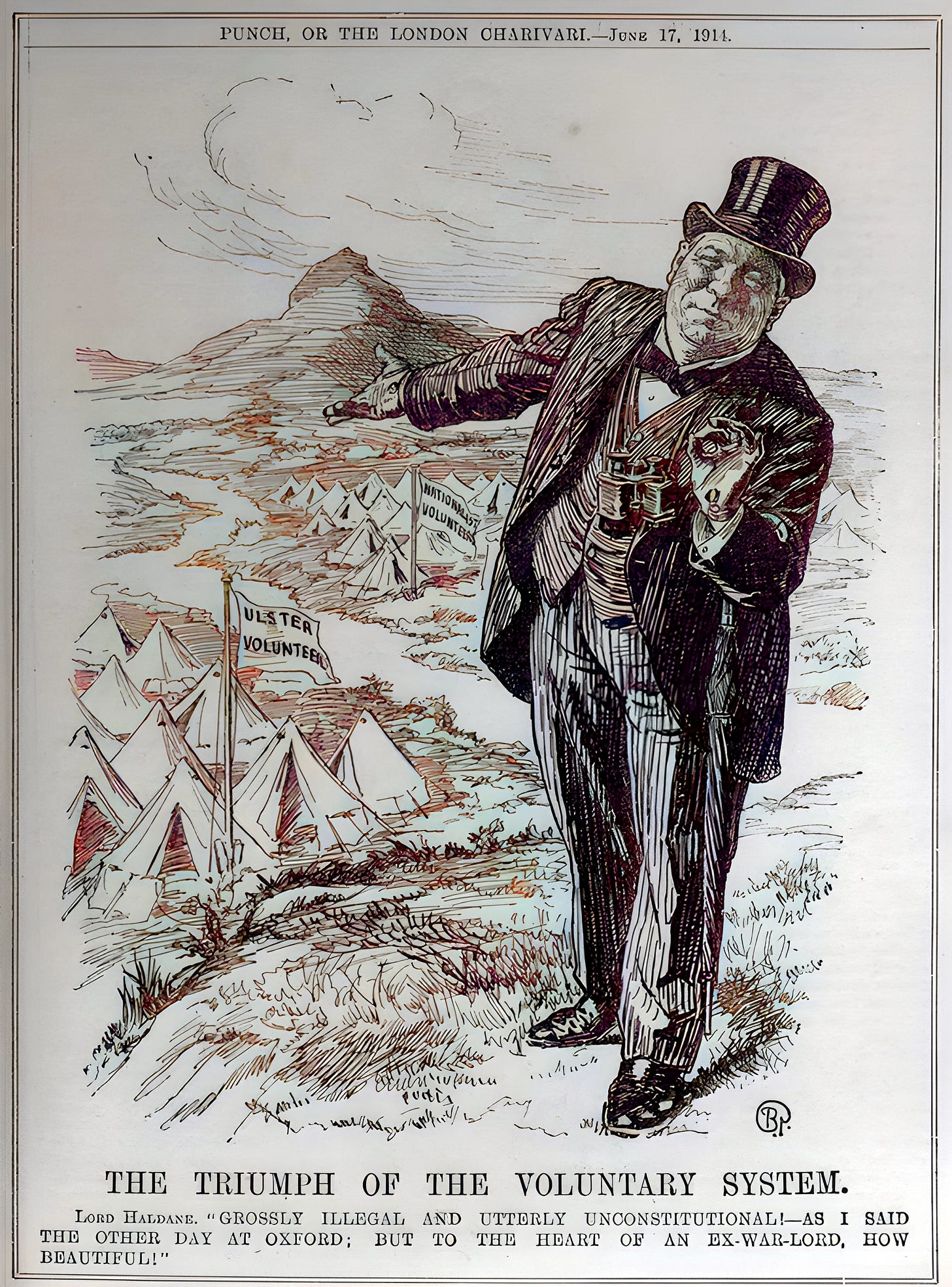Radical Extremist, Tory Die Hard
"Do you plan to hurl the full majesty and power of the law, supported on the bayonets of the British Army, against a million Ulstermen marching under the Union Flag and singing 'God Save The King'? Would the Army hold? Would the British people – would the Crown – stand for such a slaughter?"
- Andrew Bonar Law, leader of the Conservatives
1914: Ulster is now the focus of conflict, but the protagonists are unchanged from 1909
The Irish crisis, just like the Lords crisis, can be viewed as a derivative of the ongoing attempted Single Tax revolution. The Irish crisis was the Land War returning home, to the West’s symbolic heart of poverty.
“It is characteristic of prerevolutionary situations that hardened conservatives and counterevolutionaries deliberately exaggerate all disorders in order to press and justify energetic precautionary measures. In turn, advanced reformers or revolutionaries similarly distort and distrust the intentions and actions of their domestic antagonists.”
- Arno J Mayer, Domestic causes of the First World War (1969)
“In 1912 the Tories decided that a Parliament controlled by a Liberal majority was a bad thing.
Everything they did in the next two years was aimed, not against Home Rule, but against the very existence of Parliament. … Their conscious aim was to destroy Liberalism ; their unconscious aim was to ruin an institution which they were pledged to protect. An utterly constitutional party, they set out to wreck the Constitution; and they very nearly succeeded.
I do not believe,” Mr. Churchill went on, “ that there is any real feeling against Home Rule in the Tory Party apart from the Ulster question, but they hate the Government, are bitterly desirous of turning it out, and see in the resistance of Ulster an extra-Parliamentary force which they will not hesitate to use to the full”.
- George Dangerfield, The Strange Death of Liberal England (1935)
- Michael R. Gordon, Domestic Conflict and the Origins of the First World War: The British and the German Cases, The Journal of Modern History, Vol. 46, No. 2 (June, 1974)
“Our economic inquiry led us to a certain truth. The same truth explains the rise and fall of civilizations.
Subtle alchemy is extracting the fruits of their labor from the masses in every civilized country, in ways they do not realize. It institutes a harder and more hopeless slavery in place of the one that has been destroyed. It brings tyranny out of political freedom, and must soon transform democratic institutions into anarchy.
The world is pulsing with unrest. There is an irreconcilable conflict between democratic ideas and the aristocratic organization of society.
We cannot permit people to vote, then force them to beg. We cannot go on educating them, then refusing them the right to earn a living. We cannot go on chattering about inalienable human rights, then deny the inalienable right to the bounty of the Creator.”
- Henry George, Progress and Poverty, Ch 43, The Central Truth (1879)
“The Plot” - Lloyd George campaigns against war
In this cartoon Lloyd George is a burglar about to rob John Bull, symbol of the nation. Bull is relieved to find that the Chancellor only wants his money. He had been dreaming of something horrible, possibly involving the Chancellor, a “plot” …
In the previous part of this series, we discussed the high profile conflict between Lloyd George and Churchill over navy spending as a deeper conflict over the direction of international relations. Lloyd George announced he was in favour of de-escalation, and threatened to use his control of finances to reign-in arms spending. The money would be better spent on reform - the re-opening of the land campaign underlined this. With the sudden insertion of site value rating (the holy grail, Land Value Taxation) into his budget, Lloyd George was pitting the Single Tax against not only unemployment and industrial strife, but against war itself.
For a more political interpretation, consider what The Spectator said at the time, about “the plot”:
The Spectator, 31 January 1914, The Navy Estimates and Mr. Lloyd George: “the plot to cut down the Navy Estimates has failed”
We do not say that Mr. Lloyd George definitely meant to place himself at the head of the Little-Navy movement. He is like the Boer rifleman who is not happy in a fight unless his pony is tethered a few yards behind him. He no doubt provided for his escape. He fired a shot at the enemy to draw their fire and see what their strength was. He was still uncertain as to what popular feeling there was behind an agitation for less taxation in support of the Navy. He was also flurried and angry at the prospect of a large deficit at the Treasury. His motives may not have been perfectly clear even to himself, but that he did deal a slap in the face to Mr. Churchill is perfectly plain to anyone who reads the interview. The innuendo—we might say the malice—of the language is unmistakable. For the purpose of a comparison between present expenditure and former expenditure he went out of his way to choose the period that would be most hurtful to Mr. Churchill's feelings. He referred to Lord Randolph Churchill, who "resigned rather than assent to the proposed Estimates for the Army and Navy." He then went on by implication to show that Mr. Churchill had failed where his father had behaved nobly, by asserting that now was the opportunity for "overhauling" our Naval expenditure.
"I think it is the most favourable moment that has presented itself during the last twenty years." After talking about the "organized insanity " of naval competition, Mr. Lloyd George continued :— "This is a propitious moment for reconsidering the question of armaments. And unless Liberalism seizes the opportunity, it will be false to its noblest traditions, and those who have the conscience of Liberalism in their charge will be written down for all time as having grossly betrayed their trust. The new temper among the peoples of Western Europe is a fundamental consideration for a Liberal Government to take into account and act upon. Two or three years ago the position was different. If then, or even a year ago, we had taken a bold and independent step towards restricting the growth of armaments, a reaction would have been provoked which would have been fatal to any real endeavours towards economy for years to come. But this is the right moment, and it is imperative, in the highest interests of civilisation, that we should seize it."
Having uttered those words, Mr. Lloyd George went to Algiers. An act of grosser disloyalty to a colleague, or a blow more injurious to the solidarity of the Cabinet, cannot well be imagined.
The Spectator, 24 JANUARY 1914, Another Land Campaign
In the midst of the excitement created by Mr. Lloyd George's unexpected pronouncement upon the Navy, the public has failed to notice the importance of a letter written by the Chancellor of the Exchequer to the Land Values Group in the House of Commons about a fortnight ago. This group, which is important not so much on account of its size as on account of its activity, has been alarmed lest the Government should be meditating an abandonment of the principle of taxing land values. To members of the Land Values Group this principle is of greater importance than almost any question of contemporary politics. Inspired by Henry George's ideas, they believe that every conceivable social reform depends upon the taxation of land on its prairie value. Mr. Lloyd George's Budget for 1909 was a somewhat clumsy attempt to give effect to this principle.
The extreme Land Valuers in the House of Commons. though welcoming these steps in the direction of their principle, were by no means satisfied, and have since been intermittently pressing the Government to give full effect to the Henry George conception of a universal tax on the site value of the land. In view of the now admitted failure of the Land Value Taxes of 1909, the Government were naturally shy of proceeding further, and it may be fairly assumed that the land campaign started by Mr. Lloyd George last autumn was intended both to cover up the failure of his Land Taxes and to sidetrack the demand for a new scheme of land taxation.
In view of this danger to their creed the Land Valuers have organized themselves, and have at length succeeded in extracting from the Chancellor of the Exchequer a letter which appears to commit him completely to their view.
He writes : "You may depend upon it that the Government definitely intend to utilize the valuation which they are putting through at great expense for purposes of compelling the owners of sites, which are not now bearing their share of local taxation, to contribute on the basis of the real value of their property. There is no intention of shirking the issue. Of that I can assure you."
The letter goes on to say that there are several alternative proposals for taxing site values, and that the Government must be allowed time to consider which of these proposals is best, especially as the members of the Land Values Committee are not themselves agreed upon this point. This may mean a somewhat prolonged postponement of any practical scheme for any general tax on land values, but it means an immediate political campaign, supported by the Government, in favour of such taxation. In other words, the country will have to face another land campaign on the top of that sketched out by Mr. Lloyd George in the autumn and sanctioned by Mr. Asquith.
Further quotations:
… the valuations now being made by an army of officials throughout the kingdom … Mr. Lloyd George's new Doomsday Book …
Until Henry George's book, Progress and Poverty, upset the minds of a good many otherwise sober Englishmen and more Scotsmen ….
In his new land campaign speeches, Lloyd George re-employed the anti-landlord rhetoric which had been so controversial in 1909-10. This time, however, his allegations - like the allegations made agianst him during the Marconi affair - were specific. His comments on the Sutherland clearances (part of the Scottish Highland clearances), and on “rating anomalies” involving the Duke of Sutherland and other landowners actually provoked a vote of censure against him in Parliament, the latest tactic to damage Lloyd George.
Many more “rating anomalies” were likely to be revealed by the great valuation, due for completion in a year.
Lloyd George: “The land question has been put off for about thirty years. We are going to have another try at it, because we find that it is at the bottom of every question of social reform.”
“In fact all the great questions which affect the social condition of the people are controlled very largely by the conditions of the land problem.”
“Eighty-one houses to the acre. There is no breath there, there is no air there, no light, there is no joy.”
“I went to the East End”
“These are the men my heart goes out to. These are the men I should like to fight for.”
“I want to see the political stream irrigating the soil, so that there should be a harvest on it”
Lloyd George’s radical move caused by “a pistol presented to his head by the Land Values League”
Mr Cassel:
Report on the move to censure Lloyd George in Parliament.
Lloyd George resoundingly turns the tables on his accusers…
Lloyd George: “I have been told no end of times that it is very improper to quote Scripture in connection with the land discussion”
“In the history of the Highland glens there is a black page”
“Who wrote that?” (… Joseph Chamberlain)
The Highland clearances - a mechanism for driving up Glasgow land values
The Single Tax was seen as a “Liberal policy” and became a barrier to closer Labour-Liberal co-operation on social reform.
The Land Inquiry Committee’s Final report (the “Urban” report, which followed the previous autumn’s “Rural” report) removed the last reason for legislative delay.
“But Single Taxers, as much as any one else, recognise the drawbacks of change”
“Not one dollar for charity, but millions to prevent the need of it”
Why Single Tax principles were able to spread in western Canada.
Due to the arms race, Lloyd George was forced to increase conventional taxation.
The Budget 1914 - “epoch-making”
“Mr Lloyd George hopes to repeat his 1909 coup.”
Josiah C Wedgwood, leader of the Single Taxers in Parliament: “We, the Radical party”
The Single Taxers and the Future of Liberalism 1906-14
“Single-Taxers embodied the extraordinary spirit of rebellion that was abroad in the country”
The Single-Taxers were one of those political pressure groups, so typical of Edwardian Britain, whose adherents believed that they had found a relatively simple way to cure the ills of society.
They offered a radical and non- collectivist alternative to socialism, and their belief in individualism and a minimalist state appealed to many working-class voters who were unhappy with the increased tax burden and element of compulsion that came with such New Liberal measures as the National Insurance Act.
Indeed, it was a radical vision that competed with the collectivist ideas of ‘New Liberalism’ or of the Labour Party, and which its advocates claimed was more dynamic than either. Writing in the Christian Commonwealth of February 1914, for example, Wedgwood claimed that the Single-Taxers embodied the extraordinary spirit of rebellion that was abroad in the country, while the Labour Party was becoming more and more conservative. Labour men were essentially bureaucratic socialists, while his movement was individualistic:
‘We believe that The State Has No Right to take from the individual anything that the individual creates. All that the State has a right to take is what the community creates – for instance, the economic rent of land.’
In the summer of 1914, the Land-Taxers were more optimistic of success than at any time since 1906. The Government had at last agreed to introduce site value rating, and the legislation was due in a few months’ time. The movement was solidly, if not always enthusiastically, behind the Liberal Party.
Certainly, in the summer of 1914, the Single-Taxers had every reason to believe that they would continue to play an important, and growing, part in Liberal and progressive politics for the foreseeable future.
- Paul Mulvey, The Single Taxers and the Future of Liberalism 1906-14 (2002)
- Donald Lammers, Arno Mayer and the British Decision for War: 1914, Journal of British Studies, Vol. 12, No. 2 (May, 1973)
Due to procedural and financing issues, Lloyd George was forced to drop site value rating (LVT) from that year’s budget. This set up 1915 to be the decisive year of the Land Campaign and of Liberalism’s Single Tax revolution.
“slow down or hurry up?”
Rowntree wrote in mid-May pleading with LG. 'I know how anxious you are that the Land Campaign should succeed, and I can assure you its success is being seriously interfered with for want of a more clearly defined policy with regard to the above and other matters.' 'Very sorry to be such a plague,' he concluded, with some asperity, 'but it's your own doing! You asked me to make the Campaign go, and I am trying to!' At the end of the month, having heard the widespread rumours of an election, he wrote again almost in desperation. What of the political situation? The campaign presently was aiming at an election in 1915. Do you want us 'to slow down or hurry up?'
Asquith clearly had made up his mind on Thursday that the beginning of the land programme would have to be postponed for at least a year even at the risk of losing his chancellor of the exchequer.
All of this does not contradict the assertion that historically the land programme is the most significant project of the new Liberalism.
- Bentley B. Gilbert, David Lloyd George: The Reform of British Land-Holding and the Budget of 1914, The Historical Journal, 21 (1978)




